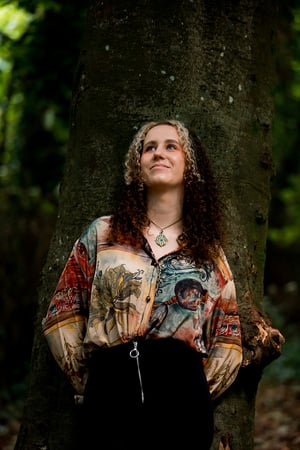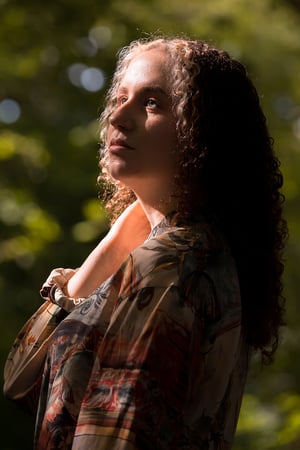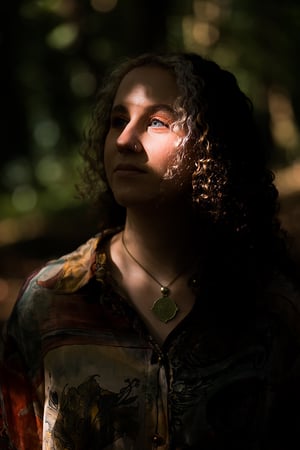Innovation in Sound student Sabrina Fletcher shares some initial research into why the game audio industry needs a level up in gender diversity.
Despite growing numbers of female gamers, women and minority genders remain underrepresented in the video game audio industry. According to the 2016 GameSoundCon Game Audio Survey, women comprise just 10.4% of game composers and sound designers and earn only 73% of what their male counterparts do.
This discrepancy is something that dBs student, Sabrina Fletcher is digging deeper into. Since completing her Music Production and Sound Engineering Honours project on gender inequality in music production, she’s decided to extend her investigations into the game audio industry for her MA in Innovation in Sound. We caught up with her to find out more.

Why is game audio such a male-dominated industry?
“As a gamer myself, I had an initial hunch that there are barely any non-male music and audio workers in the game industry. The more I look, the more I am finding, but my observation is they don’t seem to be held in the same esteem. This led me to my main hypothesis, which is that non-males are under-recognised in video game sound.”
Although just at the beginning of her year-long Masters project, Sabrina has a number of ideas about why this might be the case. “One idea I want to look into is that this is a product of who’s in charge. In the big game companies, it’s mainly cis-gendered, white men. That’s not me making an attack on this group, but it’s possible these individuals won’t be as sensitive to the issue as they haven’t faced differential treatment because of their gender. They may not be as aware of the benefits diversity can bring.”
Masculine marketing
The dominance of male perspectives in the game industry is reflected in its approach to marketing, which, Sabrina tells me, is heavily weighted towards stereotypically ‘masculine’ themes. “I should probably say that I’m using ‘masculinity’ in inverted commas here,” Sabrina laughs, “because I don’t believe things are objectively masculine and feminine, but yeah the focus is nearly always on guns and fighting, all the things we expect guys to like. I think this kind of presentation turns women away. They see it and think it’s not for them.”
“Of course a lot of games really are just guns and fighting, but there are others which are a lot more than that, but they are still marketed in the same way. Assassins Creed is a good example. Yes, there’s a lot of fighting in it but personally, I like those games because of their story development and references to history and those bits aren’t advertised at all.”
These attitudes and approaches stem from the early days of video games, Sabrina tells me. “When the Gameboy was first released, it was literally marketed as ‘the gaming console for boys’. That was the tagline. Obviously, that was in the 90s and we’ve moved on now, but that subtle use of language remains and can still subconsciously feed the idea that gaming isn’t for girls.”

Sabrina is a singer, songwriter and producer, as well as an avid gamer
The representation of women in video games
The portrayal - or in some cases complete absence - of women and non-binary characters within video games may also have an impact on how many women are pursuing careers in this field. “Many games don’t give you the option to customise your character. That means you often have no option but to play as a white middle-aged man, which even for someone who loves gaming like me, can get boring! Very often, female characters are simply there for the plot or depicted in a highly sexualised way. This can be hard for women to identify with.”
“Personally, when I play a character whose experiences I can identify with I enjoy it more and care more about it. For example, in Assassin's Creed Liberation, you get to play as a black female. This is one of the lesser-known games of the franchise but honestly, it’s one of my favourites, simply because it’s so empowering. We need more games with interesting female leads, women of colour, non-binary people and queer women.”
Gender expression and sexuality
An exploration of gender expression and sexuality is also something Sabrina is planning on incorporating into her research. “It’s important to me to not just look at cis-gendered women because that would not be representative, it would not be diverse and it would not be true to what life really is. Not only did I want to include trans people but also non-binary people, gender fluid people and gender non-conforming people in general. I realise a lot of these people are also queer and that’s a big part of their identity so I’d like to look into this and find out how much of an impact that has as well as their gender identity.”
The benefits diversity can bring
The importance of diversity in game audio extends beyond matters of fairness and accessibility, Sabrina tells me. "I am interested in what the diversity would add to the music. Would it be the same? Would it be different? Would it be a bit of both? I think it could just benefit from change. There are a lot of musical tropes that get repeated quite a lot. Whilst there are many amazing male game composters, I think cis-gendered males don’t necessarily need to be as innovative to stand out or prove themselves. People outside of that bubble have to do different things to impress people, which shouldn’t be the case but it does result in greater diversity in the music."

"You shouldn't be held back by inequalities in your environment" – Sabrina
Personal experiences
Given her inherent interest in the ways gender plays out in the audio industry, I am keen to ask Sabrina about her personal experiences as a woman in sound.
“When I originally decided to pursue music at a further education level, I didn’t even consider doing music technology and production. I saw myself as a performer, songwriter, not as someone that did the behind the scenes work. That of course was a product of how I saw things at the time, as I had never experienced it.”
“Now of course I see things completely differently. There is something very satisfying about having someone listen to my work and me being able to say ‘I did all that’. The writing, the singing and the production. Sometimes people are surprised. Not in a horrible way, but maybe because I’m a woman they don’t expect it and there’s an element of pride in being able to prove them wrong. I like having full autonomy and to not have anyone else’s vision overstep mine, so it’s genuinely really empowering.”
A message to women in music technology
What would she say then to other women considering going into the male-dominated world of music technology? “Go ahead with it. You shouldn’t let yourself be held back by the inequalities in your environment. I can understand why you might be worried about it but you have to remember you are there for you. You’re not there for anyone else. It can be daunting being in the minority but ultimately it’s very empowering to get through it and come out the other side”
“Also you have the power to set the precedent for other women and minority genders who come after you. When I came to the dBs open day, I spent most of my time speaking to a female student. I felt really inspired by chatting with them. I felt like they were like me. It helps to see other women doing what you want to do, and so hopefully over time, we can help redress the balance.”
Check our Sabrina's music on Bandcamp.
If you’re interested in pursuing postgraduate research like Sabrina,
check out our MA in Innovation in Sound degree.

